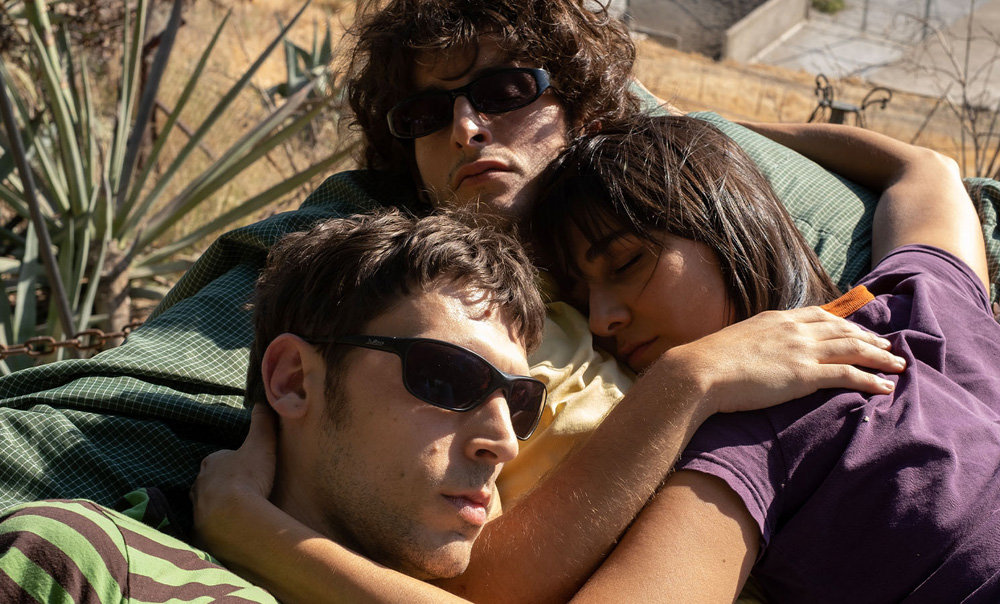Isaki Lacuesta and Pol Rodriguez knew they had found the right people to play Los Planetas, the band at the center of “Saturn Return,” when they weren’t in sync with them as they performed live.
“Probably the most difficult thing was that they didn’t want to play with [a backing track where] while you’re playing, you can have a rhythm that you are attached to, but they told me, ‘It won’t work because we need to feel free,’ said Lacuesta. “I accepted that, but then in every shot, it’s very subtle, but they have different rhythms, so it was hard to edit the film. At the same time, we had the truth and the energy of life.”
It doesn’t seem as if a day has past since the band first electrified Spain in the 1990s with a sound similar to British New Wave to watch Lacuesta and Rodriguez’s lively drama, but they were never known for harmony, at least off-stage where it was creative tension that led to real sparks. Although the filmmakers have openly cited Los Planetas as their inspiration, it made less sense to try to nail down facts of the band to convey a truth than to play fast and loose with events that occurred during their time in the limelight, honoring the competitive spirit that propelled them forward with various narrators with contradictory memories of what happened. It is all too perfect that it’s a member that’s just left the group who sets the tone when their former bassist May (Stéphanie Magnin) introduces the film in a state of heartbreak, describing the act she was a part of along with the lead singer (Daniel Ibáñez) and the guitarist (Cristalino) who are never addressed by name as “a band in 500 pieces.”
If Los Planetas exists in fragments, “Saturn Return” plays out as a gorgeous mosaic as it unfolds in the band’s native city of Granada, radiating the verve of their shows at underground clubs and inevitably the loneliness of being in rarefied air where the pressure of creating something as successful as their last album weighs on them and the lure of addiction is never far away. Although their highs and lows won’t be unfamiliar when the struggle to keep it together is hardly a novel one, the approach is when Lacuesta and Rodriguez are guided more by music than other movies, indulging in fluid and exuberant stream-of-consciousness sequences where emotion can be more powerfully articulated in chord progressions than in words, the latter seen as more fallible by a band that can only seem to express agreement with their instruments.
While “Saturn Return” will make its way into U.S. theaters next spring, the film was recently selected as Spain’s official entry to the Oscars’ Best International Feature race and Lacuesta spoke about how he encouraged different wavelengths as he ultimately got everyone on the same beat for the film, working on its unconventional structure and ensuring nothing would be lost in translation from the raw energy he and Rodriguez could conjure on set to bring to the screen.
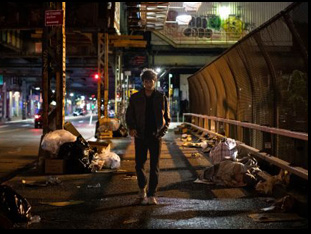
It was a story that came from the scriptwriter [Fernando Navarro] because he used to work in Granada in the same clubs that Los Planetas used to go to and he told that to Cristobal [Garcia], the producer, who is a music fan. They’ve been working on the film for five or six years., and finally, they offered it to me because they knew that I really love music, especially bands like Los Planetas. Now I have a band and we’re playing, so I feel very close to these kind of subjects.
And I liked the idea of making a film for people who don’t know Los Planetas, like my mother, for example, and or people who would believe that they are a fictional band and doesn’t exist, so we tried to work on the script like this. If you are a Los Planetas fan, you will find a lot of details very well developed by the art department. For example, the actors are playing the real instruments that they used to play — the same guitar, the same cables. But at the same time, we invented a lot of things that didn’t happen. That was because when I talked to them, all of the members of the band had different versions about what happened. They don’t remember. They lie. They were on drugs. And each member would like to make a different movie, so I decided to to make a non-documentary film [where all these different] movies [could exist] and let the audience think and decide [what’s true] by themselves.
How did you approach this visually? Every scene looks like it could be an album cover.
We worked for several months with Takuro Takeuchi, the DOP to make very iconic images. We were looking for a different look when today we are all working with the same kind of material — with the same cameras, with the same lenses, the same sensors. It doesn’t matter if you’re working on Hollywood or in Spain or you’re working on a commercial or a video clip or with your cell phone, so we tried to work with with some noise in the image and to develop a dramatic sense of the image that is changing through the film. We also tried to take a very subjective approach [where] every character in every moment has a different approach. We liked the idea of having a film changing its style in the same way that a musical album can change style depending on the song.
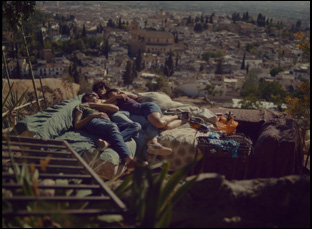
It’s very subjective, and the bass player who left the band [early on in the film], she is living by day, so she’s surrounded by light. And the other members of the band, [who continue to play] music still live by night like vampires. We really liked the idea of making a kind of science fiction or horror movie because these subjects are very close to Los Planetas. I’m also very attracted to this aesthetic because as a spectator, I grew up with these kind of films in the ’80s and especially in the 90s. The moments on drugs, especially with the guitar player — that happened in real life. He was already out of the band because he was always on drugs. He disappeared, so I told them even before writing the script that I could think about them like a vampire who is the singer who needs to drink the energy and the ideas of the others, and as a ghost who is always disappearing like the guitar player.
You find such wonderful actors to play this band. How did you get them together?
It was really difficult because we didn’t like the idea of having a movie a movie with playback [for the music]. We wanted them to play live. So we needed actors who were able to play music and to speak with the accent of that zone. We weren’t looking for physical similarities [to the people they were playing], but we needed actors who share the same energy of Los Planetas, so if a fan of the band looked at them, he can imagine that they are Los Planetas. That was a long work and I’m very happy with the work of the casting director Marichu Sanz, who found all of them. All of them are professional music players, but we couldn’t find somebody for the singer and finally, Daniel Ibañez, who plays the singer is a professional actor, but in real life, he used to have his own band. Then the deal was how to make all of them play together. I didn’t want to have different approaches of playing, so we were working on rehearsals for several months. Now they really are like a band.
And I like to work with the script, but during the rehearsals, we could change the script because they propose things. Even during the shooting, I like to be very open to all the ideas because I know that I have the first and the last word, so I’m very open to gifts. In this case, as professional music players, they know much better than me how to play and how to react when they have a discussion, but when they have a discussion, [I’d ask] how can it be motivated for musical reasons? So I ask them a lot of things and they always have responses and it was a very collective work.
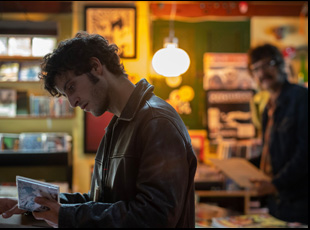
It’s always a work in three parts, and we try to work on that during the writing, then again during the rehearsals and during the shooting. And of course, you finish the film, you write it again during the editing process, so we discovered a lot of things with the editor. One of the first ideas I had when they proposed to make the film to me was this kind of a structure [with multiple perspectives] because I knew that it was impossible to explain an objective story. I didn’t want to make a monument of [the band] and to tell people, “This is the truth.” I think I don’t know what was the truth and I think nobody does. I think it was more exciting to work with these different approaches and let the [singer] contradict the guitar player. And we wanted to have also a musical approach during the editing. Sometimes you have a very good scene, but it doesn’t work in that moment of the film. And even in the big blockbusters of Hollywood made with 50 screenwriters and a lot of prevision, sometimes they are wrong. And there are a lot of sequences that are finally deleted. But I don’t think of that as a problem. That’s something very exciting and good for the movie to discover things during the process.
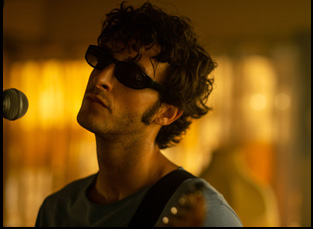
It was great. We did a lot of [test] screenings to see if we reached this idea of making a film attractive for people who were not especially interested in Los Planetas or even in music, so we knew that it worked [before putting it out into the public], but we didn’t expect the emotions that we found at the premiere. Pol [the co-director] and I didn’t think that it could be such an emotional film, but we were misreading the capacity of music for getting people in emotions. And now Los Planetas are celebrating their 30th anniversary, and the film is helping them to reach a new generation of spectators. It happened even during the process of the film. Our crew was composed by people from different countries, different generations, so lots of them thought that it was a fiction band, and they discovered the band during the process of shooting the film. At the same time, [the band] is making new music and discovering newer styles all the time. It’s not like if they’re playing their ’90s music. They are changing all the time, rediscovering themselves. They are a very alive band, and I like this need of reinvention.
“Saturn Return” will be released in the U.S. by Outsider Pictures in spring of 2025.




